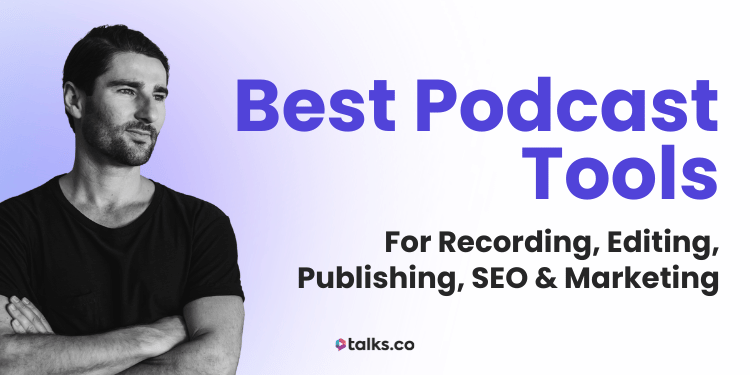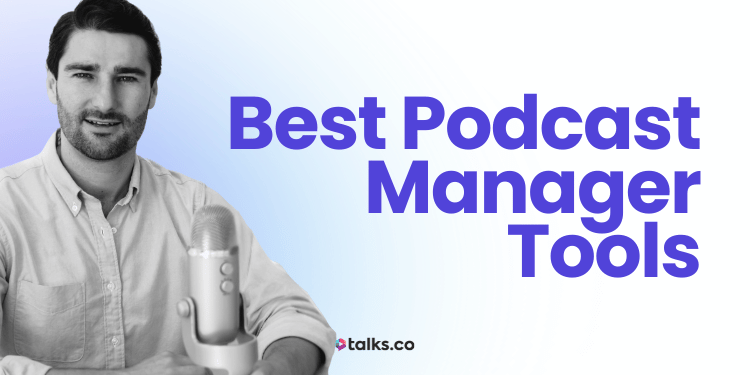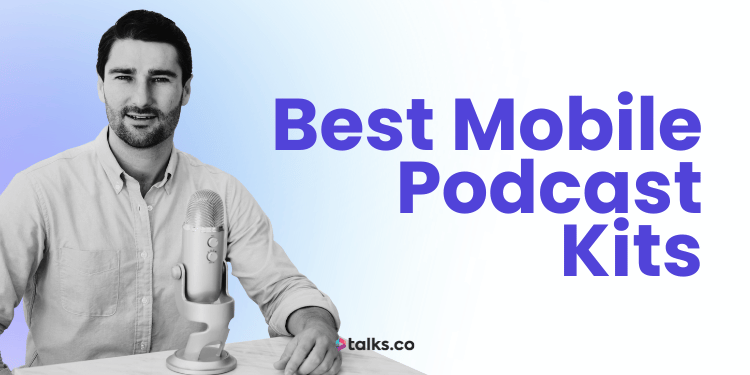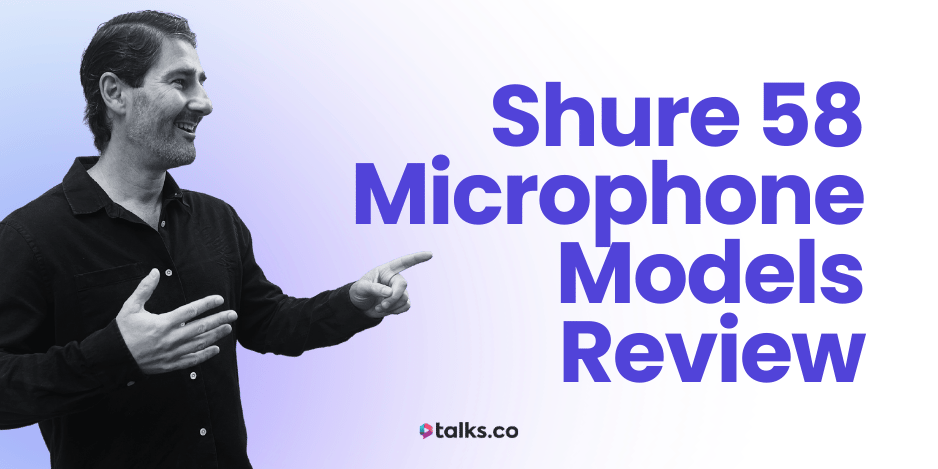Land more podcast interviews, grow your audience, and create better episodes with our growing collection of free AI podcast generators and tools.
This set of free podcast generators will help you with everything from naming your show and crafting a compelling description to writing intros, episode titles, scripts, and guest interview questions.
My Podcast Tools Cheat Sheet
Starting a podcast can feel like juggling a dozen things at once. You’ve got ideas bouncing around, guests to schedule, recordings to manage, and then all the tech that comes with it.
Pick the wrong tool and suddenly an hour of work turns into three.
This list is all the podcast tools I actually use or recommend, broken down into categories like recording, editing, publishing, analytics, and marketing.
Free, paid, AI-powered, Mac-friendly, video-ready? It’s all here.
Think of it as a cheat sheet: everything you need in one place to keep your podcast running smooth and stress-free.
What Are Podcast Tools?
Podcast tools are the software, apps, and equipment podcasters use to create and grow their shows. They cover everything from recording and editing to publishing, hosting, analytics, and marketing.
Without the right tools, it’s harder to keep your podcast professional, consistent, and discoverable.
Podcast tools meaning
Podcast tools are the tech that makes podcasting possible. They help you capture audio or video, polish it, publish it, and share it with your audience.
Some tools focus on sound quality, others on distribution or promotion, but together they form the toolkit that keeps your podcast running smoothly.
Podcast tools examples
Here are the main types of tools you’ll use:
- Recording apps: Capture high-quality audio or video with tools like Audacity or Riverside.
- Editing software: Clean, mix, and polish episodes using Adobe Audition or GarageBand.
- Hosting platforms: Store and distribute episodes across multiple platforms like Buzzsprout or Libsyn.
- Publishing tools: Push episodes to podcast directories like Spotify, Apple Podcasts, and Google Podcasts with ease.
- Analytics dashboards: Track downloads, listener trends, and engagement to measure performance.
- Marketing tools: Promote your podcast episodes with SEO, audiograms, and social media sharing podcasting tools.
27 Best Podcast Tools
These are the tools I use and recommend for every stage of podcasting from recording, editing, and publishing to analytics and promotion.
Pick the ones that fit your level, and you’ll have everything you need to create and grow a podcast that actually gets heard.
Best AI podcast tools
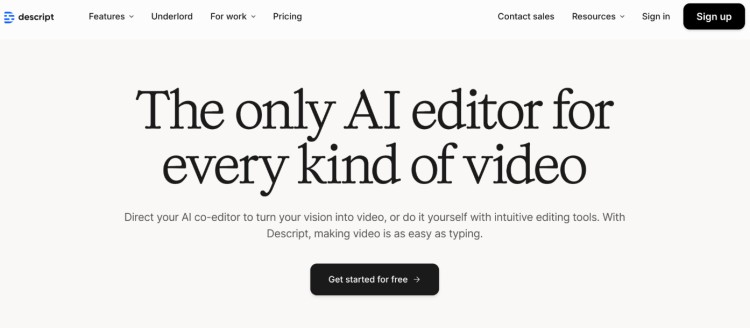
AI is changing the way podcasts get made. These tools handle the boring stuff like transcription, cleaning audio, even some editing so you don’t have to.
1. Descript
Best for: AI-powered editing, transcription, and multi-format outputs
Turn audio and video into editable text with Descript. Cut, rearrange, remove filler words, generate captions, audiograms, and even overdub your voice. Speeds up post-production and keeps episodes consistent.
- Price: Free basic; Paid plans are $24-$65/month
- Key features: AI transcription, multitrack editing, overdub, screen recording
- Pros: Fast editing, transcription built-in, video/audio support
- Cons: Advanced features have a learning curve
2. Podcastle
Best for: Browser-based AI recording and editing
Record interviews and edit with AI noise reduction, transcription, and clip creation. Podcastle is mainly browser-based so no downloads needed.
- Price: Free basic; Paid plans are $19-$64/month
- Key features: AI noise cancellation, transcription, multi-track recording, clip generator
- Pros: Easy to use, AI-enhanced, beginner-friendly, iOS compatible
- Cons: Limited advanced editing
Best free podcast tools
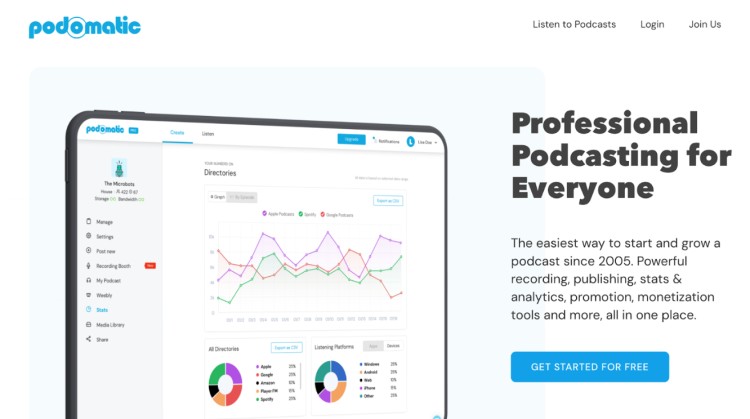
Budget-friendly podcasting for beginners doesn’t have to mean compromise. These free tools cover the essentials so you can get started without spending a dime.
3. Podomatic
Best for: Free hosting and publishing for beginners
Podomatic lets you upload, publish, and share episodes quickly. It handles RSS feeds, basic analytics, and social sharing, so you can get your podcast out easily.
- Price: Free basic; Paid plans are $9.99-$49.99/month
- Key features: Hosting, RSS feed management, basic analytics, social sharing
- Pros: Beginner-friendly, quick setup, social integrations
- Cons: Limited storage and advanced features on free plan
4. Audacity
Best for: Free audio recording and editing
Audacity is the Godfather of recording, cutting, and polishing audio. Open-source and available on Mac, Windows, and Linux, it’s been giving podcasters like you and me full control with zero hidden fees or costs since 2000.
- Price: Free
- Key features: Multi-track editing, effects, noise reduction, plugins
- Pros: Free, cross-platform, powerful editing tools
- Cons: Interface feels dated; learning curve for beginners
Podcast tools for beginners
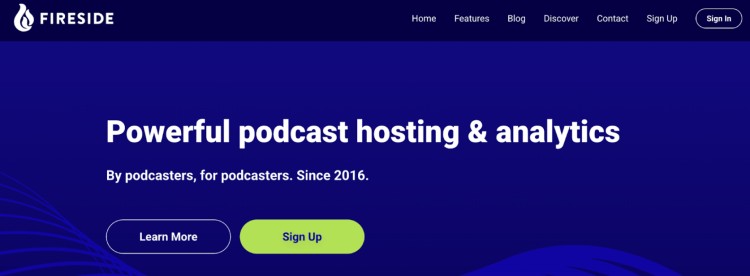
New to podcasting? These apps and platforms make it simple to hit record, edit, and publish without getting lost in menus or settings.
5. Fireside
Best for: Simple podcast hosting and publishing for beginners
Fireside makes it easy to upload, schedule, and share episodes. Built-in analytics and a clean interface help you get started without getting bogged down in technical details.
- Price: $9-$49/month
- Key features: Hosting, analytics, RSS feed, episode scheduling
- Pros: Beginner-friendly, clean dashboard, reliable hosting
- Cons: Higher-tier plans needed for larger shows
6. Otter.ai
Best for: Automatic transcription and note-taking
Otter.ai converts your recordings into editable transcripts instantly. Perfect for interview-based podcasts, show notes, or creating captions.
- Price: Free basic plan; Paid plans are $16.99-$30/month
- Key features: Live transcription, speaker identification, searchable notes
- Pros: Fast, accurate, easy to share transcripts
- Cons: Limited export options on free plan
Read how to record a podcast for more strategies and Talks tips.
Podcast recording tools

Good audio starts here. These are the best software for podcast interviews that make recording your voice and guests smooth, clear, and reliable.
7. Zoom
Best for: Remote interviews and multi-guest recordings
Zoom is widely used for recording podcast interviews with guests anywhere and my personal go-to. It saves both audio and video files, making it easy to edit later.
- Price: Free basic plan; Paid plans are $13.33-$18.33/month
- Key features: Multi-guest recording, screen sharing, separate audio tracks, audio/video export
- Pros: Familiar platform, reliable, easy for guests to join
- Cons: Audio quality isn’t as strong as dedicated tools
Want to shop smarter? Check out what equipment is needed for a podcast.
8. Alitu
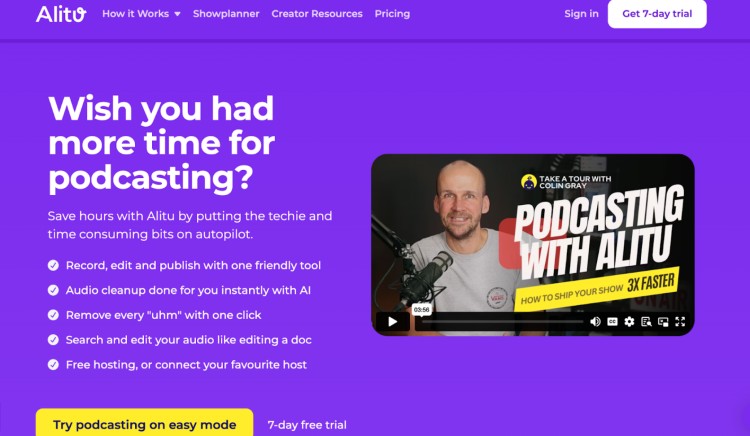
Best for: All-in-one recording and editing for beginners
Alitu simplifies podcasting by letting you record, clean audio, edit, and publish from one place. Designed for podcasters who want an easy workflow without technical headaches.
- Price: 7-day free trial; $38/month or $380/year
- Key features: Recording, automatic audio cleanup, episode builder, direct publishing
- Pros: User-friendly, time-saving, no editing experience needed
- Cons: Less control than advanced editing software
Podcast editing tools
Cuts, fades, noise removal? These tools make your raw recordings sound clean and professional.
9. Hindenburg Journalist
Best for: Story-driven podcasters and spoken-word editing
Hindenburg is built for voices, not music. It auto-levels audio, organizes clips, and makes spoken content sound clean with minimal effort. Perfect for interviews and narrative podcasts.
- Price: 30-day free trial; Paid plans are $12-$30/month
- Key features: Auto-leveling, multitrack editing, voice profiles
- Pros: Intuitive for spoken audio, fast editing, pro sound quality
- Cons: Less suited for music-heavy shows
10. Reaper
Best for: Affordable, full-featured DAW for podcasters on a budget
Reaper offers advanced editing at a fraction of the cost of other DAWs. Highly customizable and lightweight, it handles everything from multitrack audio to plugins.
- Price: $60 discounted license; $225 commercial license
- Key features: Multitrack editing, plugins, MIDI support, customizable workflow
- Pros: Powerful, low-cost, lightweight software
- Cons: Steeper learning curve for beginners
Podcast creation tools
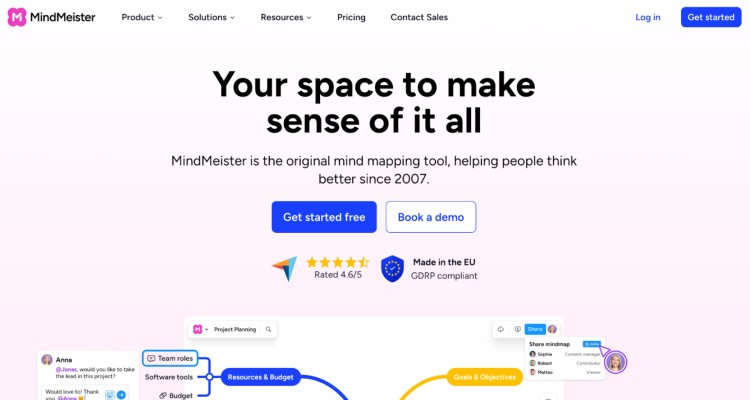
Everything from planning episodes to designing cover art. These tools help you build your show from the ground up.
11. Canva
Best for: Visual podcast branding, cover art, and episode graphics
Canva lets you design podcast artwork, audiogram templates, and social posts with drag-and-drop ease.
- Price: Free; Paid plans are $12.99-$15/month
- Key features: Templates, brand kit, one-click resizing, stock assets
- Pros: Fast, beginner-friendly, keeps visuals consistent
- Cons: Limited advanced design control, can look templated if overused
12. MindMeister
Best for: Brainstorming episodes and mapping series ideas
MindMeister gives you a visual map to organize episode ideas, structure series, and plan interview questions with real-time collaboration.
- Price: Free; Paid plans are $7.50-$19/month
- Key features: Real-time collaboration, drag-and-drop maps, export options, MeisterTask integration
- Pros: Great for planning and team brainstorming, simple to use
- Cons: Not a full project manager; needs integration for task tracking
Podcast production tools
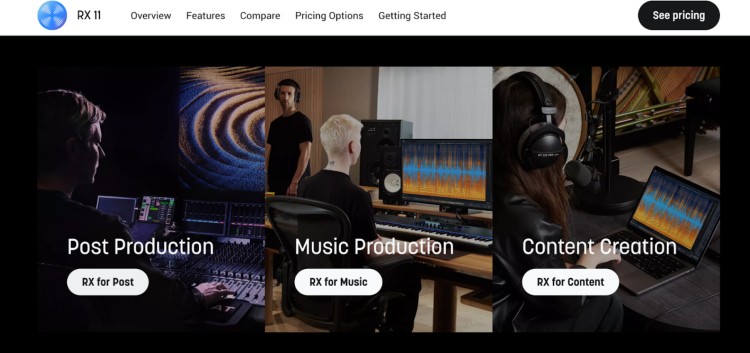
Leveling, mastering, and post-production made easy. These apps take your recordings to the next level so listeners hear polished audio.
13. Auphonic
Best for: Automatic audio leveling and mastering
Auphonic balances voices, music, and background levels so your episodes sound clean without manual editing.
- Price: Free up to two hours/month; Credits: $12 (One-Time Credits), $13 (Recurring Credits monthly)
- Key features: Loudness normalization, noise reduction, encoding, chapter markers
- Pros: Saves editing time, consistent sound quality
- Cons: Limited free hours, lacks deep manual control
14. iZotope RX
Best for: Advanced audio repair and restoration
iZotope RX removes background noise, clicks, hums, and audio flaws for professional-grade sound.
- Price: $99-$1,349
- Key features: Spectral repair, de-click, de-noise, voice isolation
- Pros: Industry standard, powerful noise cleanup
- Cons: Expensive, steeper learning curve
Podcast publishing tools
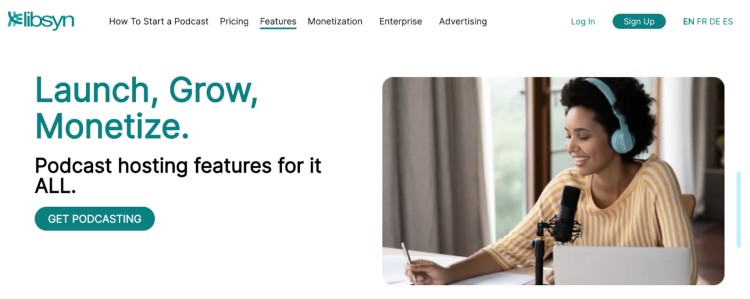
Getting your podcast online shouldn’t be complicated. These platforms make publishing straightforward, fast, and consistent.
15. Libsyn
Best for: Reliable hosting and wide distribution
Libsyn makes publishing simple with full distribution to major directories like Spotify, Apple Podcasts, and more. It also supports subscriptions and dynamic ads.
- Price: $7-$150/month
- Key features: Audio/video uploads, scheduling, advanced stats, ad insertion, premium subscriptions
- Pros: Rock-solid reliability, flexible monetization, detailed analytics
- Cons: Interface feels outdated, advanced features only on higher plans
16. Spreaker
Best for: Hosting with built-in monetization options
Spreaker combines podcast hosting, live broadcasting, and ad monetization in one platform.
- Price: Free plan available; Paid plans are $20-$250/month
- Key features: Distribution to all major platforms, live podcasting, programmatic ads, listener analytics
- Pros: Easy monetization, live podcasting support
- Cons: Fewer advanced editing tools
Podcast hosting tools
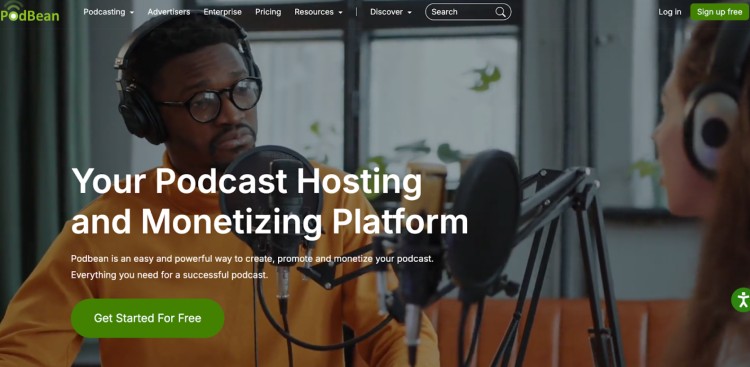
These essential tools keep your episodes live, manage your RSS feed, and give you some insight into how your podcast is performing.
17. Podbean
Best for: All-in-one hosting with strong monetization options
Podbean offers unlimited hosting, distribution, live streaming, and built-in monetization through ads and premium subscriptions.
- Price: Free plan available; Paid from $9-$79/month
- Key features: Unlimited storage/bandwidth, ad marketplace, premium podcast subscriptions, live podcasting
- Pros: Unlimited hosting, multiple monetization paths, user-friendly
- Cons: Analytics not as advanced as competitors
18. Transistor
Best for: Serious podcasters running multiple shows
Transistor lets you host unlimited shows under one account, with advanced analytics and private podcasting options for teams or memberships.
- Price: 14-day free trial; Paid plans are $19-$99/month
- Key features: Unlimited podcasts per account, detailed analytics, private podcast feeds, team management
- Pros: Great for businesses with multiple shows, advanced analytics, clean modern dashboard
- Cons: Higher starting price than some competitors
Video podcast tools
Recording or streaming video alongside your podcast? This tool makes video episodes simple to capture and share.
19. StreamYard
Best for: Live streaming and recording video podcasts
StreamYard lets you host multi-guest live shows, record in high quality, and stream directly to social platforms like YouTube and Facebook.
- Price: Free plan; Paid plan is $44.99/month
- Key features: Multi-guest streaming, branding overlays, screen sharing, recording
- Pros: Browser-based, easy for guests, professional-looking streams
- Cons: Free plan limits recordings and branding options
Spotify podcast tools
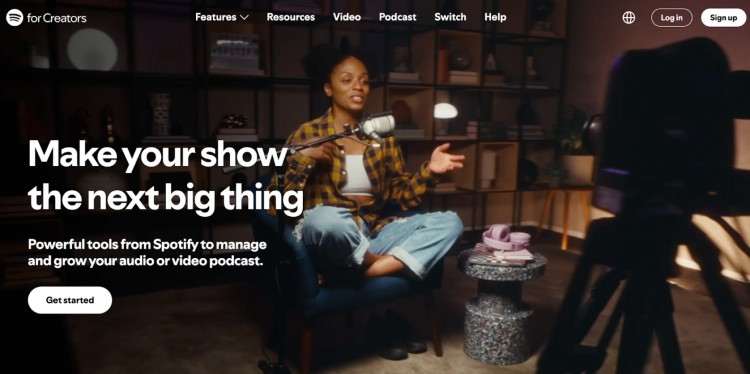
If you want your show on Spotify, there’s no better place to go than the source itself to help with submission, analytics, and keeping things optimised.
20. Spotify for Creators
Best for: Managing and publishing podcasts on Spotify
Spotify for Creators helps you submit episodes, track listener stats, and optimise content for Spotify’s audience.
- Price: Free
- Key features: Episode uploads, analytics, Spotify-specific insights, listener demographics
- Pros: Free, Spotify-optimised, direct stats access
- Cons: Limited to Spotify, fewer editing options
Adobe podcast tools
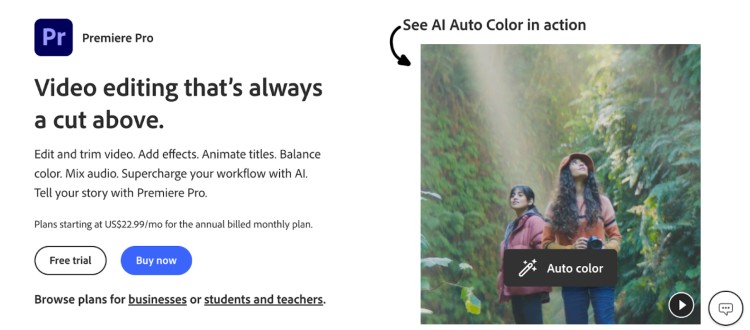
For advanced editing and production, this podcast tool gives you full control over audio and video quality.
21. Premiere Pro
Best for: Advanced video and audio editing for podcasts
Adobe Premiere Pro provides full control over editing, effects, and video podcast production for professionals.
- Price: 7-day free trial; $22.99/month
- Key features: Multi-track video/audio editing, effects, color correction, motion graphics
- Pros: Industry-standard, powerful for video podcasts
- Cons: Steep learning curve
Google podcast tools
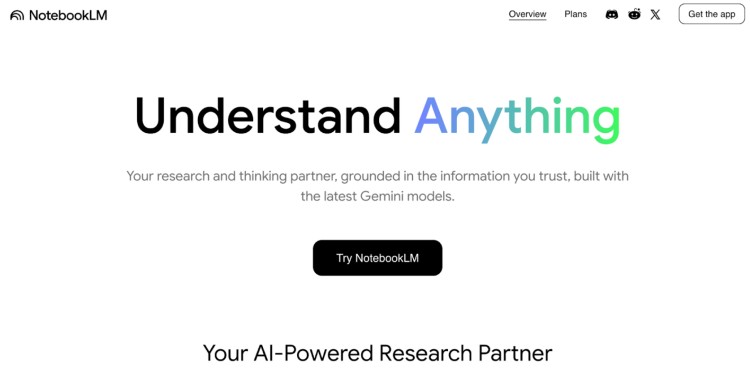
22. Google Notebook LM
Best for: Turning research into listenable podcasts
Notebook LM can take slides, documents, or text and generate a podcast-style audio summary. It’s a clever way to prep episode notes or quickly turn research into something you can actually listen to.
- Price: Free
- Key features: Audio Overviews, document import, shareable links, playback speed control
- Pros: Cloud-based, hands-off audio creation, integrates with Google ecosystem
- Cons: Experimental, only English, not a full recording or editing tool
Podcast tools for Mac
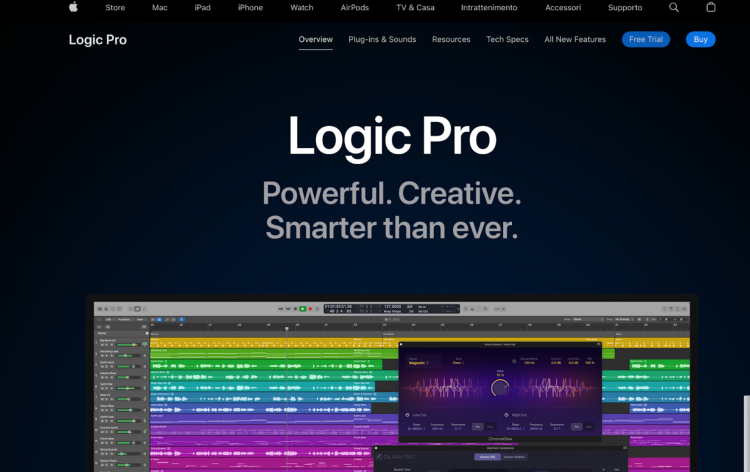
Mac users get this unique option that makes recording, editing, and producing a breeze.
23. Logic Pro
Best for: Anyone with a Mac who wants professional audio editing software
Logic Pro gives podcasters advanced audio tools, multi-track editing, and music integration, perfect for polished, professional episodes.
- Price: $199.99 one-time, $4.99/month for iPad
- Key features: Multi-track editing, effects, virtual instruments, high-quality audio processing
- Pros: Powerful, Mac-optimized, one-time purchase, iPad compatible
- Cons: Mac only, can be complex for beginners
Podcast SEO tools
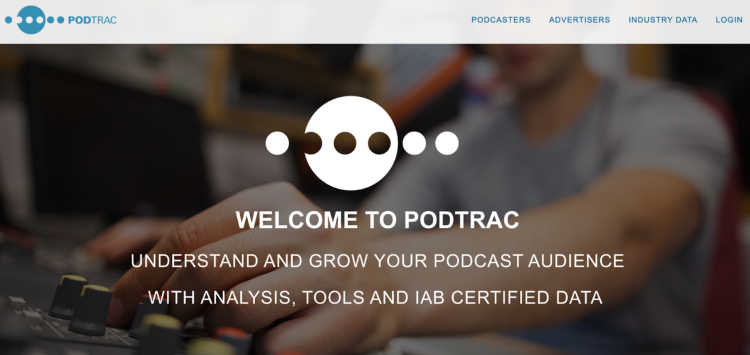
Make sure people can actually find your podcast. Use this tool to track visibility and give tips to boost your discoverability.
24. Podtrac
Best for: Tracking podcast audience and performance
Podtrac gives you reliable analytics on downloads, listener demographics, and episode trends so you know exactly how your podcast is performing.
- Price: Free for basic analytics; Paid plan at $20/month
- Key features: Audience measurement, download stats, listener demographics, trend reporting
- Pros: Trusted in the industry, clear metrics, free basic plan
- Cons: Advanced features require registration, not a publishing platform
Podcast marketing tools
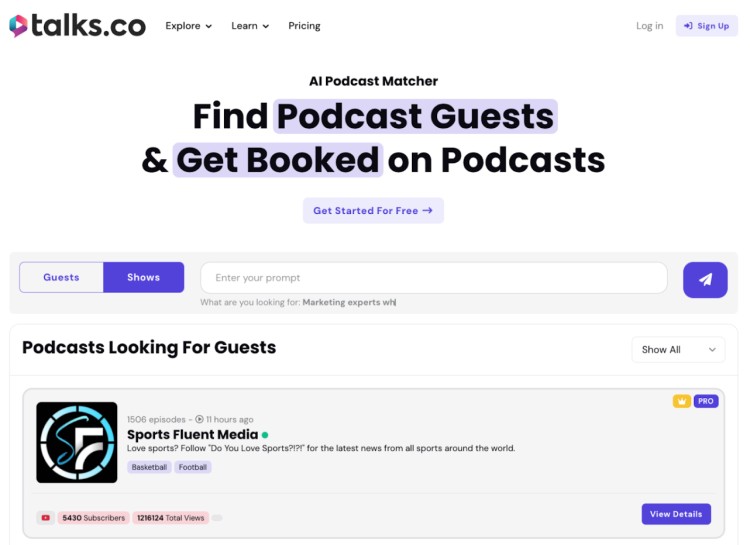
Getting your episodes in front of the right listeners matters just as much as recording them. These tools help you grow visibility, connect with hosts or guests, and make sure your podcast gets heard.
25. Talks
Best for: Making your podcast visible and connecting with the right guests
Create a free Talks.co profile to show off your episodes and expertise. Hosts and potential guests can discover your show, making it easier to book interviews and grow your podcast.
- Price: Free to create a profile; Paid plans are $9-$90
- Key features: Profile with episodes and expertise, AI guest matching, interview scheduling, promotion support
- Pros: Quick setup, helps you get seen, connects you with relevant guests
- Cons: Advanced features limited on free plan
Podcast analytics tools
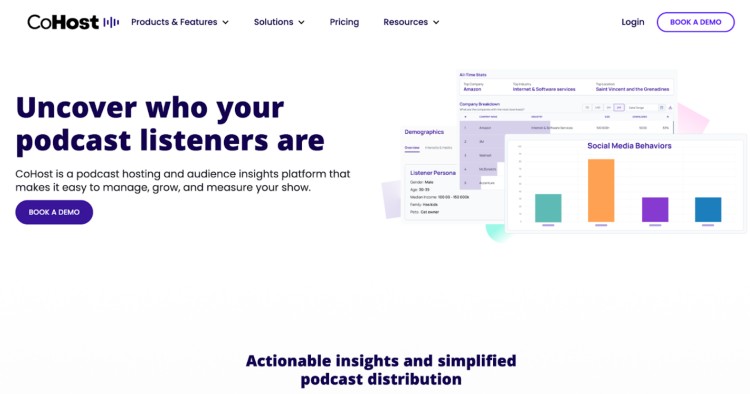
See who’s listening, how many downloads you’re getting, and what’s working so you can plan smarter.
26. CoHost Podcasting
Best for: Simple, team-friendly hosting and collaboration
CoHost Podcasting makes it easy to manage multiple shows, schedule episodes, and collaborate with co-hosts or editors.
- Price: 7-day free trial; Plans are $14-$49/month
- Key features: Episode scheduling, team access, direct publishing, analytics
- Pros: Intuitive interface, great for teams, affordable
- Cons: Limited advanced features compared with bigger hosts
Podcast manager tools
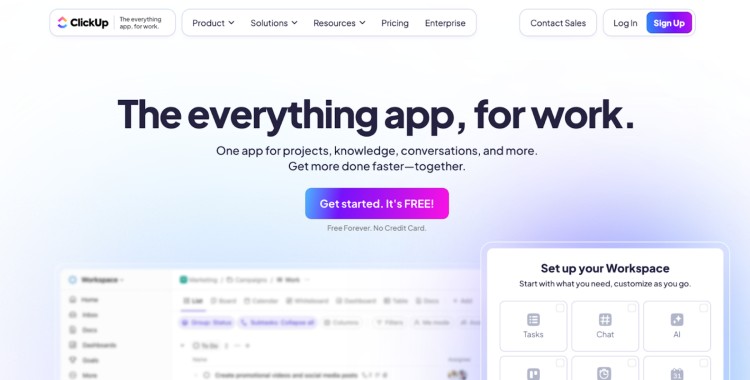
Keep episodes, guests, and production workflows organized so nothing slips through the cracks.
27. ClickUp
Best for: Managing podcast projects and workflows
I use ClickUp daily to manage all my podcast guest appearances and online businesses, and you can use it to plan episodes, schedule guests, and keep your production on track.
- Price: Free plan; Paid plans are $10-$19/month
- Key features: Task management, reminders, collaboration, integrations with other tools
- Pros: Flexible, centralizes podcast workflow, free plan is strong
- Cons: Can feel overwhelming at first, takes setup time
Basic Tools to Start a Podcast (Checklist)
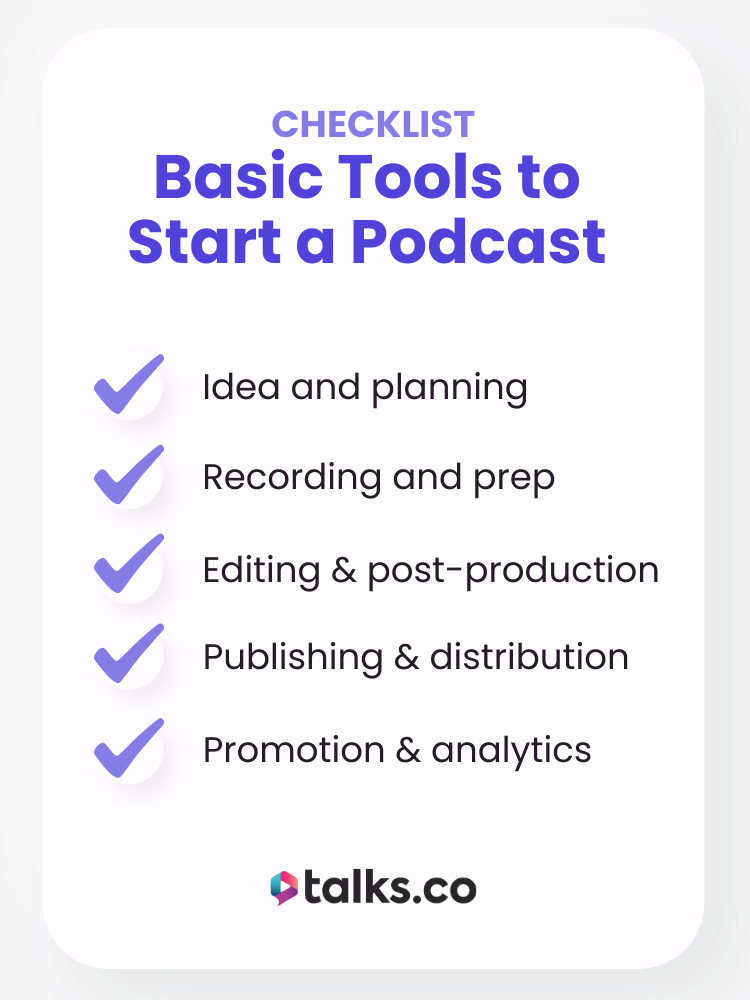
Starting a podcast doesn’t have to be complicated. Use this checklist to move from planning your idea to publishing and promoting your episodes.
☐ Idea and planning: Brainstorm episodes and outline scripts or guest questions (e.g., MindMeister, Notion, Evernote).
☐ Recording and prep: Set up your mic, test audio with your podcast recording app, and record a short test episode (e.g., Blue Yeti, Audacity, Zoom).
☐ Editing and post-production: Clean up recordings, reduce noise, and enhance audio (e.g., Adobe Audition, GarageBand, iZotope RX).
☐ Publishing and distribution: Upload to hosting platforms and push to Spotify, Apple, and Google Podcasts (e.g., Libsyn, Podbean).
☐ Promotion and analytics: Track listeners and create shareable assets (e.g., Podtrac, Canva, Headliner).
For more on getting started, check our Talks guides on podcast equipment for beginners and try our podcast name generator.
Podcast Generators Made By Talks
These tools are built by the Talks team to support creators at every stage. While they don’t replace the advanced features available to our Talks Pro members, they’re a powerful starting point, especially if you’re launching your podcast or want to create better content, faster.
Podcast Name Generator
Generate unique, brand-worthy podcast name ideas based on your topic.
Here are your results:
Generating content…
Podcast Tagline Generator
Craft a catchy tagline that communicates your podcast’s value in seconds.
Here are your results:
Generating content…
Podcast Description Generator
Write a compelling podcast description for directories like Apple and Spotify.
Here are your results:
Generating content…
Podcast Episode Titles Generator
Come up with attention-grabbing episode titles your audience will want to click.
Here are your results:
Generating content…
Podcast Bio Generator
Create an expert bio that makes you stand out as a credible guest or host.
Here are your results:
Generating content…
Podcast Question Generator
Generate smart, relevant interview questions for your next guest episode.
Here are your results:
Generating content…
Podcast Intro Generator
Write a professional-sounding intro script to kick off each episode.
Here are your results:
Generating content…
Podcast Outro Generator
Write a professional-sounding outro script to end each episode.
Here are your results:
Generating content…
Podcast Script Generator
Get a full episode outline or script based on your chosen topic and format.
Here are your results:
Generating content…
Podcast Show Notes Generator
Transform your podcast episode details into professional, SEO-ready show notes in minutes.
Here are your results:
Generating content…
Podcast Topic Generator
Find engaging topics for your podcast episodes.
Here are your results:
Generating content…
Tools of the Trade
Now that you’ve got the list of the best podcast tools, you have everything you need to create, edit, publish, and promote episodes that actually get noticed.
Each tool on this list is here to save you time, polish your show, and help it reach the right listeners without stressing yourself crazy.
If you want to take it further and actually get your podcast in front of the right audience, Talks makes it easy for hosts like you to connect with top guests and grow your show.
You can be up and running in just a few clicks and start finding the right people to interview, schedule, and feature all without the stress of searching on your own.
Create your free Talks Creator profile today and start making your podcast work harder for you.
